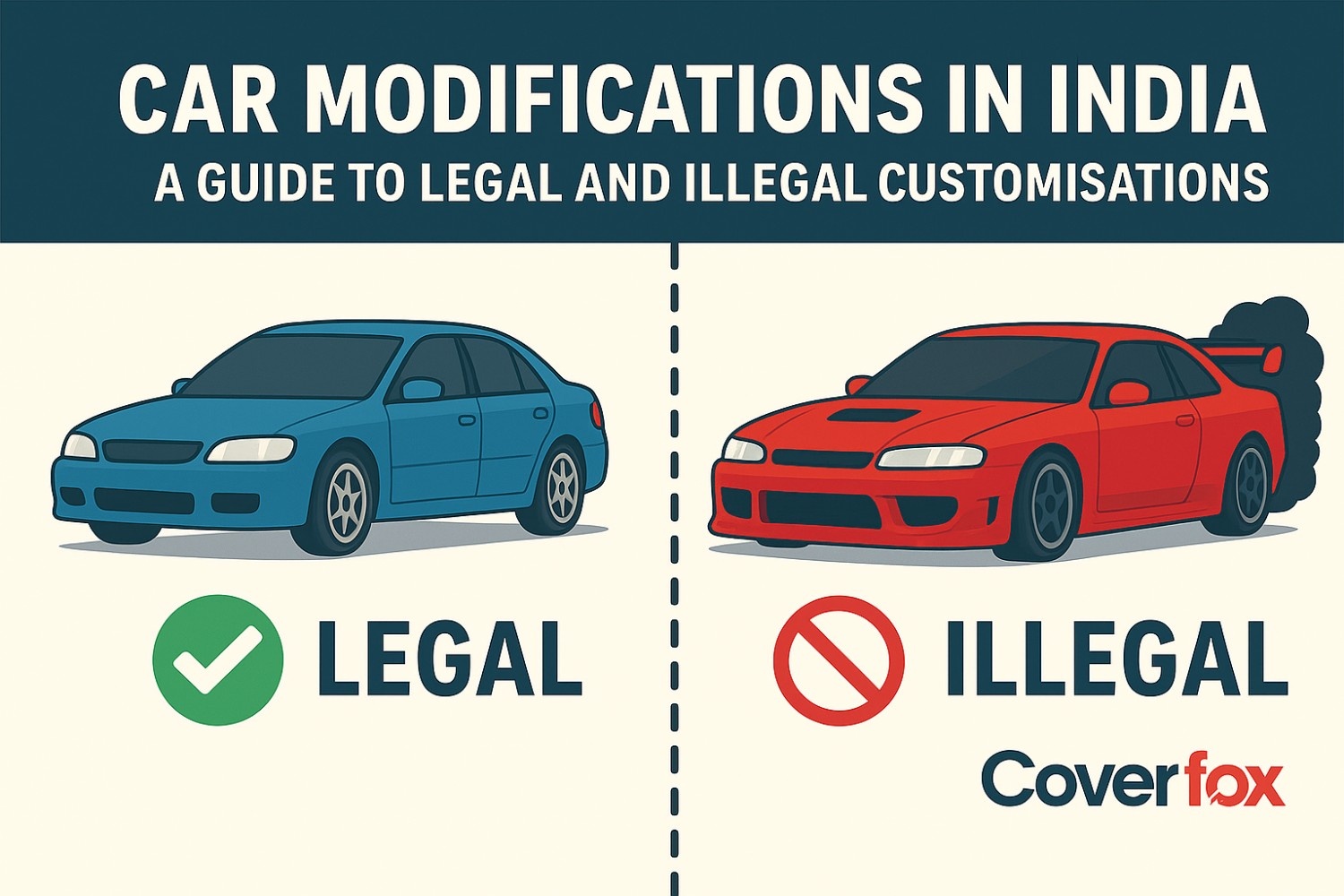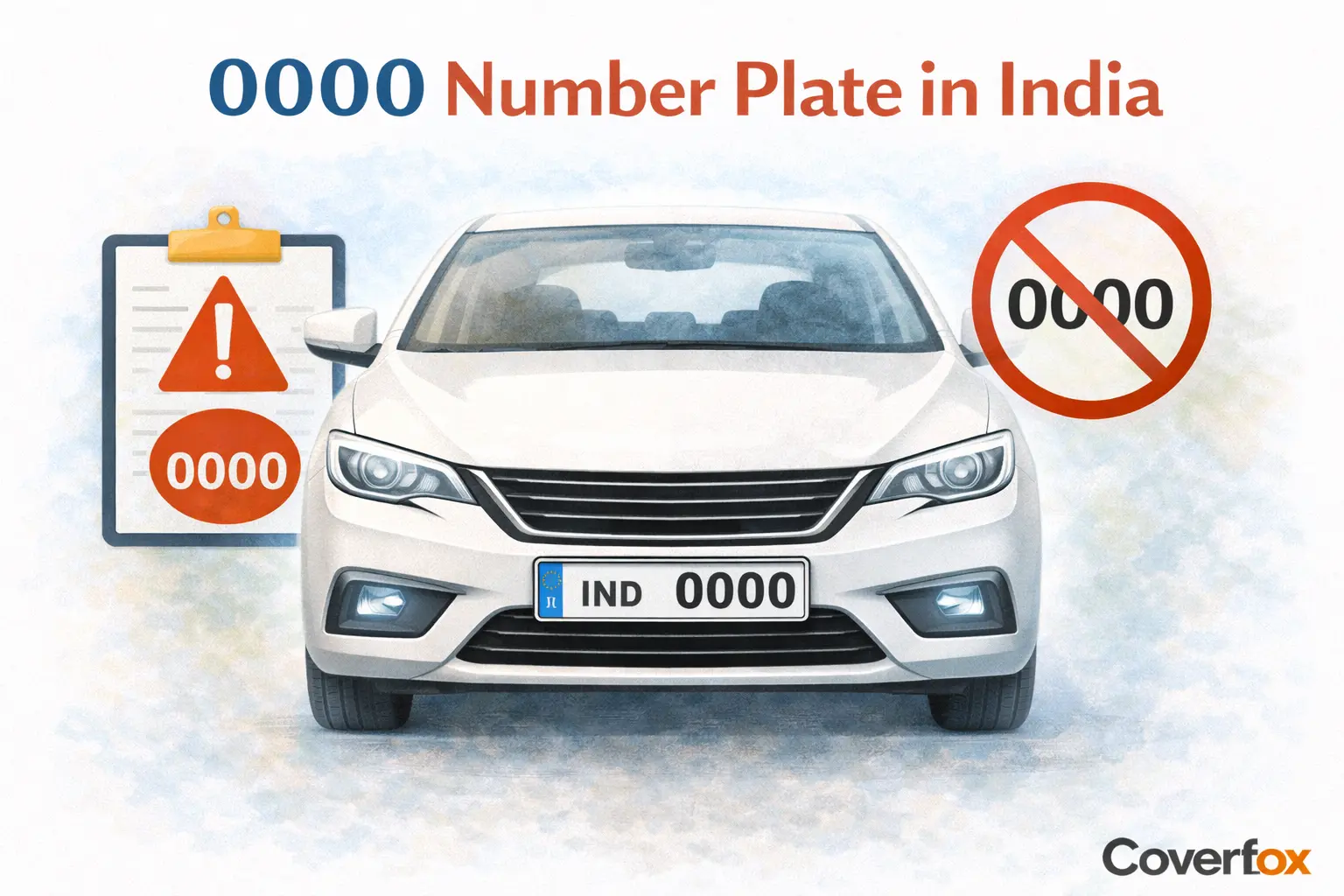How fascinating customisations can be to some people! So do car modifications to car enthusiasts. It gives you a chance to turn your normal vehicle into an extraordinary masterpiece. Modifications can be an upgrade to the current machine, a body change, or improved performance.

Though you can get creative with the vehicle, modifications come with a price of responsibility, whether it's legal in India or not. Automobile lovers can personalise their vehicle without breaking legal rules. Hence, this article guides you in understanding how to enjoy your modified car safely and legally, ensuring it doesn’t cause you any legal trouble.
What are Car Modifications?
Any changes or variations made to a car that alter its original form are called Car Modifications. They can be anything related to a car’s performance, enhancing its look, adding new features, comfort or functionality. Some usual changes people make to their cars are changing seats for comfort, alloy wheels, engine tuning, upgrading exhaust systems, changing exterior look for a stylish feel or interiors with special customisations. But while adding this personal touch, it's necessary to follow the law and regulations with safety measures.
Can You Legally Modify a Car in India?
As long as government rules are followed and safety regulations are enforced, car modifications are legal in India. Some alterations like changing audio systems, adding alloy wheels, etc, are allowed. To change the colour of the car, RTO (Regional Transport Office) approval is needed.
Though the government allows some simple upgrades, structural alterations like changing the original design of the vehicle and reshaping the body of the car are not allowed. While customising the modifications, it's essential to follow the guidelines declared by the Motor Vehicle Act Section 52: Alteration in Motor Vehicle. Always get your vehicle examined after modifying it. Prioritising safety standards and legal rules is important while making changes to your car in India. Also, it’s necessary to report your car insurance provider if you make any changes to your car, as it can affect your insurance coverage and claim process.
Legal Car Modification Options in India
Car modifications are allowed in India unless it doesn't compromise legal rules, safety and the basic structure of the vehicle. In India, you can make these changes to your car legally:
Change Paint Colour
Upgrade Lighting
Alloy Wheels and Tyres
Interior Customisation
Engine Replacements
Car Horns
CNG Kits
Number Plate
Installing LED DRLs
Changes for Differently Abled People
Upgrading Suspension
After the approval of the Registration Certificate (RC) by the RTO, you can repaint the colour of your car legally.
You can legally upgrade the lights of your car if you follow the Central Motor Vehicle Rules (CMVR) for their brightness and positioning.
Installing alloy wheels or changing tyres on your car is permitted up to a particular size limit (as instructed by the manufacturer or ±2% maximum change). If the safety of the vehicle is not hampered and doesn’t affect the speedometer or braking system, these modifications are legal in India.
As long as the car's structure remains unchanged, alterations to the seat, audio system, and steering wheel covers are permitted. Modifications made for comfort purposes are usually safe and legal.
Engine replacements are accepted according to the law if approved legally. Ensure to update RC with all the details and proper documents.
The legal sound limit is 100 dB. If you make sure that the horn sound is under this limit, horn modifications are allowed legally. Make sure that they don't give rise to noise pollution.
If you're planning to change the CNG (Compressed Natural Gas), you can. However, it’s necessary to register the modifications to the RTO. Later, you’ll get the updated registration certificate for your car.
The number plates used by the cars must be approved by the government and the High-Security Registration Plates (HSRP). Following the standard size and format is important.
Installing LED Daytime Running Lights (DRLs) is considered to be legal in India, as they are mainly helpful during rain or fog. However, too bright lights are not allowed as they can distract other drivers.
If certified by RTO, modifications done for specially abled people are legal. These changes may include accelerators, brakes, automatic clutches, mirrors, etc. and are more accessible to them.
To improve your ride comfort and handling, you can upgrade the suspension, enhancing safety on rough roads. However, incorrect modifications can compromise stability and may be illegal.
Illegal Car Modifications You Should Avoid in India
No doubt, car modifications are allowed in India, but not all changes are permitted by the Supreme Court under the Motor Vehicle Act Section 52, 1988: Alteration in Motor Vehicle (Vehicle changes must match manufacturer specs unless approved. Engine conversions need to follow rules. Fleet owners can replace engines with the same type. All changes must be reported to the RTO within 14 days. Consent needed for hire-purchase vehicles) You need to make alterations that stay under Indian law.
According to the reports, it was known that between May 21 to June 11, 2024, 11,636 motorists were penalised with banned silencers or pressure horns seized and destroyed, and ₹33 lakh total fine was collected. So, these are some modifications that are considered illegal in India:
Pressure Horns and Loud Exhausts
Additional Lights
Dark Sun Films
Structural Changes
Decorative Registration Plates
The Indian government strictly prohibits pressure horns and loud exhausts as they create noise pollution. Hence, changing them against the law can lead to fines or penalties.
Halogen lamps with white LEDs are acceptable, but you cannot use tints like red, green, blue or yellow for headlights. High-intensity discharge (HID) lamps without projectors are considered illegal, so you cannot install them.
In India, it is illegal to use dark sun films on car windows, as there are some specific visibility criteria to follow for windshields and side windows. As per the rules, front and rear windshields must have 70% visibility and side windows 50%. You cannot break this rule; if you do, it may lead to penalties and film removal.
Making changes to the original frame, body, etc, which can hamper its structural integrity, is illegal. Structural modifications to cars are completely prohibited according to the Motor Vehicle Act guidelines.
Using unapproved registration plates is illegal in India. All new cars must have high-security plates imprinted with “IND,” while older cars must use specified fonts. Violations in this lead to fines. Colourful number plates, decorative designs or irregular fonts are considered to be illegal.
Important Considerations Before Making Car Modifications
Modifications to your car can surely boost its performance, increase the comfort level, make it sleek and stylish and enhance its look and functionality, but it's essential to make sure that the changes you want to make are legal, safe and approved. These are important points you can consider before modifying your car:
RTO Approval
Safety Impact
Insurance Policy
Modification Cost
Legal Compliance
Impact on Resale Value
Purpose and Practicality
Vehicle Warranty
Availability of Car Parts for Old Cars
RTO approval is essential before making any changes to your car. Any alterations made without their approval can lead to fines. Always ensure to update the documents after approval.
Any modifications made to your car which can hinder people’s safety are not allowed. You cannot make changes in the structure, brakes, suspension, etc that can affect the control and stability of your car. Prioritising safety is more important than other things.
It's necessary to inform your insurer about the modifications to your car, as it can affect your claim settlements and policy. Some changes may increase your premium towards your policy.
The cost required to modify a car is high. So, proper planning, savings, labour, and approvals are important to make any changes to your car.
Every change you make in your car needs legal approval from the RTO and should follow the Motor Vehicles Act rules. Hence, it's important to stay updated with the guidelines as illegal modifications can lead to penalties.
As car modifications make changes to some or other parts of the car, the interior/exterior of the car, its resale value reduces. If you want to restore the car later, keep its original parts the same until required.
It's important to figure out why you are modifying your car, performance, aesthetics, or functionality. Try to avoid modifications for looks and reduce the car’s functionality. Always balance style with accessibility.
Generally, car alterations hamper the warranty of the vehicle, and the manufacturer blames the modified parts of the car if any damage occurs. It's ideal to check the warranty terms before making any changes to your car, and if possible, try to avoid modifications if purchased with an extended warranty.
Some parts of the old cars are not available on the market nowadays. Hence, before making any changes to your car, it’s necessary to check if the parts are still available.
Summing Up
In India, car modifications are legally allowed to some extent, unless they hinder safety and do not violate rules. Aesthetic modifications are all well and good as long as your registration certificate reflects those changes. Modifications like interior, colour, LED DRLs, CNG kits, aids for specially abled people, etc, are accepted only if you follow the rules and guidelines by RTO and the Motor Vehicles Act.
Other changes like loud horns and exhausts, dark sun films, and major structural changes must be avoided. Consider the insurance, safety, cost, warranty, etc, before making any changes to your car. If the modifications are well-planned, they will also enhance your driving experience without any legal problems.
Explore More:
How will Modifications Affect My Car Insurance?
What is Car Damping and its Benefits?
How to Transfer Your Car Insurance Policy: A Step-by-Step Guide
Frequently Asked Question
What is car modification?
Any changes made to the design or parts of the car for comfort, functionality, look, etc, are referred to as car modifications.
What kind of car modifications are illegal in India?
The modifications that hamper the safety of people or fail to follow the rules and regulations of the RTO and the Motor Vehicle Act are illegal.
Is adding a spoiler to a car legal in India?
If it doesn’t block visibility or risk safety, adding a spoiler to your car is legal in India.
Is it legal to change the car colour in India?
Yes, it is legal to change the car colour in India, but it must be approved and updated in the RC by the RTO.
How can I ensure my car modifications are legal?
You can check the RTO guidelines, get approved, and use authorised professionals to modify your car. Also, make sure that the modifications are legal.
Is changing the engine illegal in India?
If RTO approves, changing the engine is legal in India.
Are bigger tyres legal in India?
Bigger tyres are allowed if they safely fit and do not affect the vehicle’s speedometer or braking system.
Are modified cars in India legal?
Cars with modifications are considered to be legal if government rules and regulations are followed and approvals are made earlier.



 in Cars.webp)


